JMP Blog
A blog for anyone curious about data visualization, design of experiments, statistics, predictive modeling, and more- JMP User Community
- :
- Blogs
- :
- JMP Blog
- :
- Where champions are born (part 1)
- Subscribe to RSS Feed
- Mark as New
- Mark as Read
- Bookmark
- Subscribe
- Printer Friendly Page
- Report Inappropriate Content

But there is one sporting event that I absolutely love, which is why it’s hard to give a definitive answer to the “Do you like sports?” question. What is this event? Why do I think it is so different from other sports that I fear calling myself a sports fan? How many of these questions am I going to ask in a thinly veiled attempt at creating suspense?? Well, to label this as a mere event is to do injustice to one of the greatest gatherings of athletic prowess from across the globe that has and continues to have been achieved for over a century! That’s right, I’m talking about the Olympic Games (cue that beautiful John Williams score)!
I’ve been a fan of the Olympic Games for years. There’s just something about the spectacle of the games that excites me. Athletes from around the world compete in these games, often from countries you don’t often see in other sports. And, of course, given my love of statistics, there’s the ever-present yet ever so simple medals table, long the source of bragging rights for many a country. Now, if you’ve read any of my other blog posts (see here and here), then you’ll know I’m a bit obsessed with maps. So when it comes to the Olympic Games, I had always wondered if there was a geographic component to athletic performance. Specifically, might there be some athletes who perform better in a particular sport due in part to where they were born and/or were raised?
Now, obviously, what all contributes to athletic performance is much, much more complex than where one grew up. However, you have to admit there is something to that question. For example, if I were to randomly select an ice hockey player and ask you where they were from, chances are you might guess somewhere in Canada (and you might not be too far off). Or if I were to select a random football/soccer player and ask the same question, you might guess either someplace in Europe or Latin America. Or, watching the Games themselves, you might not bat an eye to see Jamaicans competing in track and field, but might be gobsmacked to see a Jamaican team competing in bobsled (did you catch the reference?). Or, if you’re really into the Games and a big baseball fan, you might be super stoked to see the baseball game between Cuba and Japan, but maybe not so much between Cuba and, say, Argentina. In all of these cases, we’ve grown to associate a particular country with doing well in a particular sport. In this series of posts, I intend to probe this further and see if there are particular cities and/or regions of a country that are associated with high performing athletes in a particular sport. But first, I wanted to treat you to an interesting discovery I found while analyzing the gold medalists (…ok so I might be stalling due to unfinished data cleaning…if we’re being honest…).
The Most “Golden” Cities
So of course, the question that’s on the mind of most of you reading this is probably “Which city gave birth to the most gold medalists?” Which is the most “golden” city, if you will? Well, for those following my Twitter account (@ckingstats…pardon my shameless plug), you got a sneak peek at the answer, shown below in a packed bar chart.
This was quite surprising! Maybe because I was selfishly hoping for an American city to be No. 1… But the most surprising thing about this result is the large gap between the top two cities and the rest of the pack. I mean look at it! Budapest has more than twice the number of gold medals than Berlin, which is in third place!! What’s their secret? Have they cracked some code to ensure Olympic dominance?? Let’s unpack these results.
A Closer Look – Medal Count Over Time
Now we need to keep in mind that this tally is across all Olympic Games (up to 2016) and across all sports and events. Let’s break the totals down by Olympic Games first. Specifically, let’s look at the cumulative number of gold medals for the top cities over the course of the games in this, really, really cool animation (in my completely unbiased opinion):
From this, we can see two things. First, Moscow pretty much hit the ground running in “producing” gold medals, especially during the 1960s and 1970s, the height of the Soviet era. You can see a similar trend with Berlin and St. Petersburg, both of which have a rapid rise from the 1960s to the late 1980s. Second, Budapest actually had a head start on Moscow, having accumulated medals from nearly the beginning of the modern games. But it wasn’t until post-World War II that it really took off. At first, I didn’t fully understand this trend, until some quick research revealed Hungary’s ties to the Soviet Union during that period, and all became clear again. So, in summary, a possible explanation for such high gold medal counts could be the big push for athletics in the Soviet Union.
A Closer Look – Medal Count by Sport
Let’s now take a look at splitting the medal count by sport. We’ll focus on the top two cites of Moscow and Budapest.
From the above bar plots, we can see that the gold medal counts tend to be dominated by team sports. The one exception seems to be fencing, although even for that sport, the gold medals again tend to be dominated by team sports, Men’s Sabre in both cases (interesting choice).
Now, one could argue this is a bit unfair since team sports will obviously result in more gold medals compared to individual participation sports. But, if I recall correctly, this practice is also used in the official medal counts, and so I will continue to use it here. Besides, there are individual participation sports that consist of multiple events allowing for a very good Olympic athlete (say, Michael Phelps?) to rack up medals quite easily for their respective country.
Of course, there is still a time component to these counts, so I thought I’d look into how the sports medals were accumulated using the static plots below (not as fun as the animated one, but just as informative!). For Moscow, we can clearly see how well they dominated Ice Hockey during the Soviet era, but also how it quickly dropped out as their top-performing sport shortly after the end of the Cold War. Only recently have they started gaining traction in their second top-performing sport, Synchronized Swimming.
As for Budapest, you can see that Fencing was the dominant sport both prior to WW I (in which it was part of the Austro-Hungarian empire, which was devastated after that conflict) and for much of the Cold War. It looks like they developed an affinity for the water in recent games, particularly in Canoeing and Water Polo.
Seeing the Story in the Data
The main reason I wanted to show you this, besides the surprising results and something to keep you occupied while I finish the main data, was to illustrate what I believe is a key part of being a statistician: seeing the story in the data. With something as simple as looking at gold medal counts by birth city, we got a glimpse into how history and politics affected the performance of athletes in a global event.
In an ideal world, people would want their sports to be independent of politics, but of course that’s never the case and this data set illustrates that fact beautifully. As a statistician, I often think of myself as a strange hybrid of translator and storyteller. It’s my job to help you dig into your data and extract the story that’s hidden within the numbers. That’s one of the big reasons why I love using JMP: It’s specifically designed to help you do just that.
If you enjoyed this brief foray into sports, history, and statistics, then stay tuned for my next installment, where we’ll look into all Olympic athletes and see what more stories lie hidden, waiting to be discovered and shared!
(Gold medal photo by Charles :philippines: on Unsplash)
- © 2026 JMP Statistical Discovery LLC. All Rights Reserved.
- Terms of Use
- Privacy Statement
- Contact Us

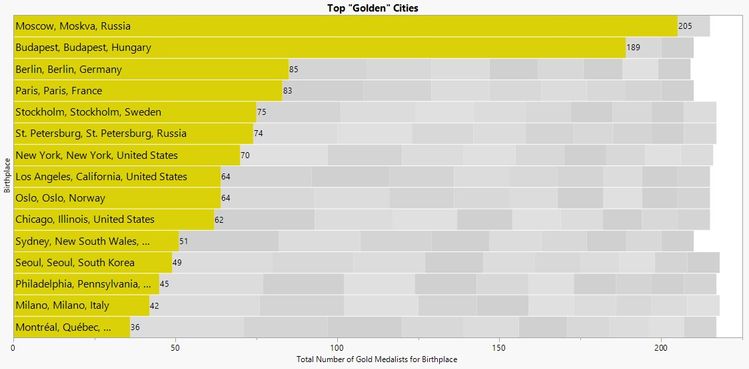
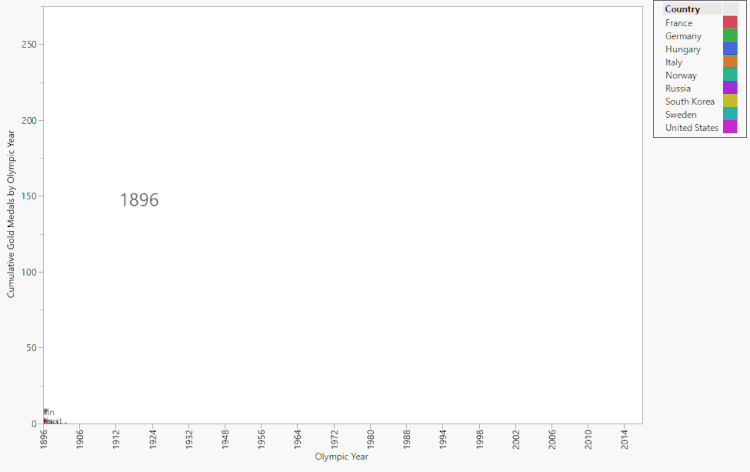



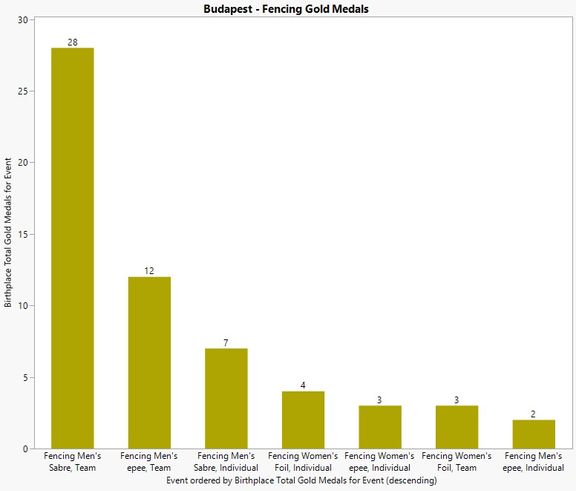
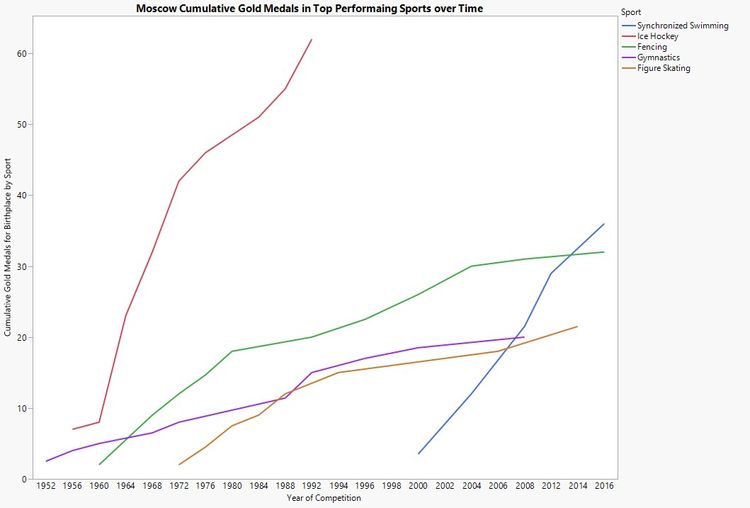
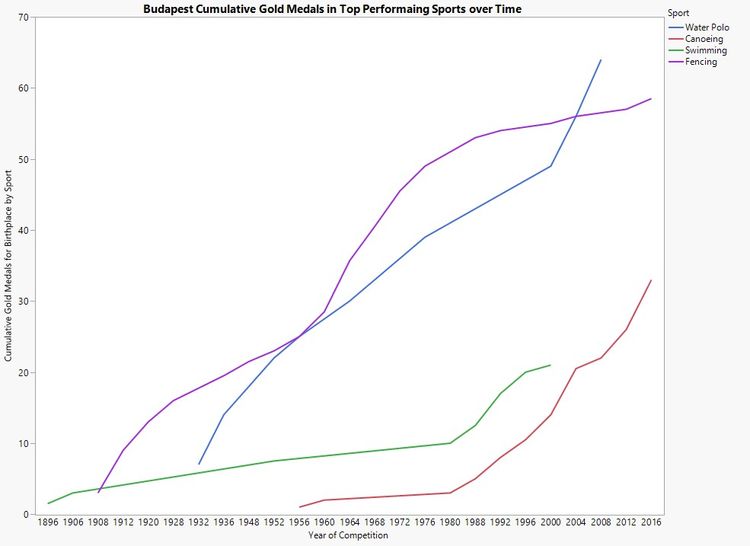
You must be a registered user to add a comment. If you've already registered, sign in. Otherwise, register and sign in.